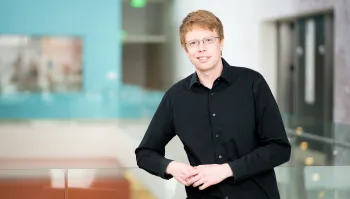
Luke Gilbert, PhD joins UCSF Urology as Assistant Professor in the Helen Diller Family Comprehensive Cancer Center, bringing with him a rigorous training in cancer biology, synthetic biology and functional genomics.
As a graduate student at MIT, he used a mouse model of an aggressive B-cell lymphoma to define how stromal cells in the tumor microenvironment modulate disease progression and drug response. Minimal residual disease following cancer therapy is a poorly understood clinical reality that is correlated with poor prognosis. His work is one of the few examples of how mouse models can be used to interrogate mechanisms of minimal residual disease in cancer therapy.
As a postdoctoral fellow at UCSF, he developed a repurposed CRISPR system that he used to turn genes on and off by editing the epigenome. CRISPR (clustered regularly interspaced short palindromic repeats), an adaptive genome defense system in bacteria and archaea, has been widely repurposed as an RNA-guided genome editing method. Dr. Gilbert and colleagues have used dCas9 or dCas9 chimeras to image the genome in living human cells or to control transcription in both prokaryotes and eukaryotes. In human cells, these methods can control transcription of endogenous genes over a wide range (~10,000 fold) by using dCas9 chimeras to deliver protein domains that either repress (CRISPRi) or activate (CRISPRa) transcription. This work shows that in essence, where Cas9 allowed editing of the genome, dCas9 chimeras allow us to edit the epigenome and to control transcription. This platform is a new synthetic tool for studying transcription, epigenetic regulation, DNA replication and DNA repair.
His unique intellectual and technical framework is well-suited to study cancer cell response to therapy. His lab will focus on new ways to model and overcome drug resistance in advanced prostate cancer. He uses genome scale screens, genetic interaction mapping and genome engineering to model and map the genetic and epigenetic causes underlying why some patients are cured and others are not by cancer therapy.
“We use human cell based models and will use mouse models of cancer in our research,” explains Dr. Gilbert. “We are developing new models of human prostate cancer to model response to innovative new anti-cancer drugs and therapeutic strategies for treating advanced metastatic prostate cancer. We are also mapping strategies for next generation polytherapies that will anticipate and circumvent drug resistance or that have synthetic lethal activity against prostate cancer cells.”
In addition, the Gilbert lab uses functional genomics to search for strategies that selectively eliminate cancers driven by deregulated Ras pathway activation such as non-small cell lung cancer and acute myeloid leukemia. See lab site for more information at https://gilbertlab.ucsf.edu
“To me UCSF is special because it is committed to excellence in both basic research and clinical medicine,” says Dr. Gilbert. “At UCSF world class scientists and doctors work together collaboratively with the common goal of curing disease through multidisciplinary integrated research strategies.”